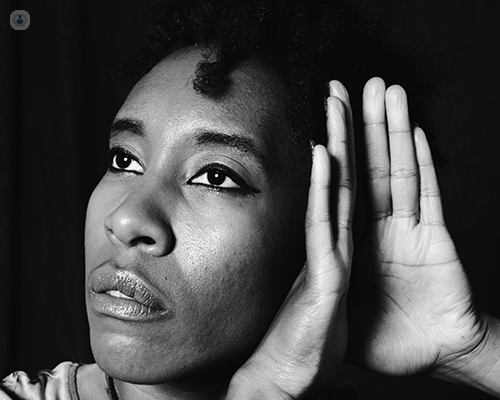What is the minimum age for receiving cochlear implants?
Written by:To people who are deaf or have severe hearing loss, cochlear implants are a way to perceive the sensation of sound of the world around them. Leading consultant ENT surgeon, Mr Nish Mehta, explains how cochlear implants are fixed in the ear and if there is a minimum age for receiving them.

What are cochlear implants and how do they work?
Normal hearing works by channelling sounds from the outside world through the ear canal, causing vibrations of a tightly hung ear drum. The ear drum passes on these vibrations to the three small bones of hearing, whose job is to amplify the vibration and transfer it to the fluid of the inner ear. The inner ear, or cochlea, is a snail shell shaped organ that converts the vibration of fluid into an electrical signal for the brain to process.
A cochlear implant is a very special type of hearing aid, engineered to directly communicate with the inner ear. It has a clever computer processor that can be magnetically attached to the area behind the ear. The computer hears sounds and converts them into an electrical code, which is transferred wirelessly through the scalp to a receiver that sits on the skull, under the skin. The receiver transmits this information along a wire that is delicately inserted into the inner ear or cochlea, where this sound information is sent to the brain to be deciphered into speech.
Who is a good candidate for cochlear implants?
Normal hearing aids amplify the sound getting to the ear drum, that is, they exaggerate the vibrations of air caused by sounds. They are very useful in mild to moderate hearing loss, but for some people, this is not enough. If the modern and well-tuned hearing aids are not powerful enough for a patient’s hearing loss, then we consider cochlear implants. We work as a team to assess patients for a cochlear implant.
What is the average age of patients receiving cochlear implants? Is there a minimum or maximum age?
For children, there are very good studies that show better speech and language outcomes the earlier they receive the implant. We aim to have assessments for cochlear implants done and tried for surgery at, or before, one year of age. However, each child must be evaluated individually and some may still have sufficient hearing, in which case we specify hearing aids and closely monitor their hearing levels.
When hearing loss develops in adulthood it has an impact on job prospects, and leads to depression and social withdrawal. In addition, there are good studies that show a potential association between untreated hearing loss and dementia. For this reason, there is no upper limit to when we would do this surgery. For those patients who have other medical problems and are concerned about a general anaesthetic, the operation can be done under local anaesthetic.
How are they implanted?
The operation takes around 90 minutes and is normally done under a general anaesthetic. A small amount of hair is shaved behind the ear and a small incision of 5-6cm is made. The bone behind the ear is drilled away to allow a safe approach to the cochlea – one that doesn’t go through the ear canal or ear drum. The natural window of the inner ear is then opened and the implant electrode is slowly advanced into the inner ear, usually providing feedback that tells us about the inner ear irritation as we proceed.
Once the electrode is in place, the window is sealed around the electrode and the wound is closed. The implant function is checked and x-rays are undertaken to make sure it is in the optimal position and working well.
The patient is normally safe to go home within 4-6 hours.
Are cochlear implants long lasting?
Yes, there are many patients who still have cochlear implants from the 1980s. Studies of implant failure show that over a 20-year period there is only a four to eight per cent failure rate, with the majority happening in the first few years.
Mr Nish Mehta is highly skilled ENT surgeon based in London who specialises in a variety of conditions, including hearing loss, cochlear implants and cholesteatoma. If you’re seeking expert assessment of your hearing, or simply wish to know more about cochlear implants, make sure to visit Mr Mehta’s Top Doctors profile today.


